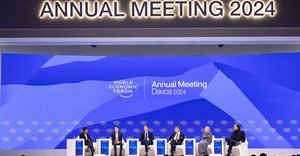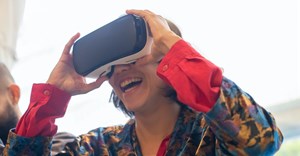Trending




 Sabre EMEA 2024 Awards: Razor PR, Retroviral top SA agenciesDanette Breitenbach
Sabre EMEA 2024 Awards: Razor PR, Retroviral top SA agenciesDanette Breitenbach
Elections 2024
Jobs
- Show Producer Johannesburg
- Fabric Weaving/Looming QC Technician Ga-Rankuwa
- Receptionist/Administrator Intern Edenvale
- Capital Equipment Sales Representative Cape Town
- Sales Consultant Bushbuckridge
- Technical Sales Representative Johannesburg
- Packaging Design Lead Cape Town
- Graphic Design Berea
- Senior Graphic/Digital Designer Cape Town
- Copywriter Cape Town
[Communications] Global communications trends
The Society for New Communications Research and Press Feed '2015 Media Trends and Corporate Newsrooms' research says the traditional format of the inverted triangle developed in 1906 for print stories is no longer the "perfect format" for news releases. The most important skill the PR team needs today, is "understanding how the media operates today" in order to pitch content.
Media has faced a barrage of challenges and massive redundancies globally as print advertising revenues have forced a trimming of budgets, leading to the "shrinking newsroom". The fact that search engines are the most trusted source of news and information and that consumers are happy receiving valuable content from brands, has put media under even more pressure, but provided huge opportunities for communications professionals.
As the report states: "A brand's PR team should be aware of these trends and work with their 'wish-list' media outlets so that they can help fill the gaps left by the gutting of the newsrooms."
![[Communications] Global communications trends](https://biz-file.com/c/1510/318027-700x364.jpg?2)
Locally, the Department of Strategic Communication at the University of Johannesburg produced the 'South Africa PR landscape 2014' report, describing the traditional role of PR agencies changing in "the volatile, uncertain and complex post-modern environment".
The report highlights the "dominance of digital technologies, branding for millennial stakeholders, the new paradigm of brand stewardship, reputation management risks, measurable return on investment and the emergence of co-creation where communication convergence is a significant challenge to traditional public relations."
The South Africa PR Landscape 2014 report, which can be downloaded for free, is part of the popular 'PR Country Landscape' series comprising 28 similar studies conducted by leading academics in global markets and published by the Global Alliance for public relations and communication management. It was requested by PRISA. It also includes a great list of resources for the profession and valuable information on South African business and society.
Nicola Nel, MD of Atmosphere Communications has just returned from the International Communications Consultancy Organisation (ICCO) global summit in Italy and writes that there is a "global optimism" about opportunities within the PR industry. "Agencies are tapping into marketing budgets with digital and tech driving the growth. Good PR companies are re-inventing as communications players using measurement and analytics to drive change."
Another key point is talent retention, a global problem, and agencies are encouraged to "hire for attitude, train for skills". One skills set that is also growing in importance globally, is reputation management, Nel says. "The 24/7-connected consumer demands immediate responses when things go wrong. The need to protect a brand - corporate, personal or political - means public relations experts are in high demand."
Current trends
These are the key trends going forward, locally and globally, curated from local PR leaders interviewed for this special communications focus and curated from international research:
- • Rethinking PR and communication business models: The SA PR Landscape report highlights the "loss of trust" among the ranks of clients and stakeholders because of stale business models in the industry. "Many (PR) agencies function in a manner where they merely carry out client commissions and instructions, charge by the hour, and avoid risk for themselves by minimising their own accountability. The practice of handing over accounts to juniors to manage once the account has been won, also does not contribute to developing the kind of strategic partnership where there is mutual accountability for the client's brand. Furthermore, the industry has been guilty of lack of strategic counsel, poor quality service, the use of middlemen and overpricing. This has resulted in loss of trust between agencies and clients. The challenge for agencies is to add strategic value and measurable return on investment for the client by hiring the very best talent that understand the industry and incentivising them to deliver value for the client."
• Crisis communication: The threat of a crisis in business is at its highest since 2009, with 49% of business leaders globally, having experienced a crisis at their current company, reports Burson-Marstellar in its 2015 EMEA Crisis Survey. According to the survey, political risk continues to be both a source of crisis, as well as an 'amplifier' during a crisis, with 25% of businesses having encountered a crisis resulting either from intense regulatory or political scrutiny. Burson-Marstellar reports that 49% of businesses have a digital crisis communications plan and that one in five businesses has been in crisis due to an online or digital security failure in this "particularly disruptive era" dominated by cyber-hackers and new brands (like Uber) to challenge traditional industries.
• Multichannel approach: PR consultancies need a multichannel approach where communication is integrated across all channels, both internally and externally, emphasises Ingrid Lotze, President-elect of PRISA.
• Branding fundamentals: Lebo Madiba, MD of PR Powerhouse says there has to be a mind shift from traditional PR to learning branding fundamentals. "It's important to make the time and understand (client) business so you are able to diversify your approach when selling their company dynamics to the media."
• Social media: Social media and the incorporation of a digital strategy into communications strategies, as well as gaining the skills to include social media in the PR bouquet have come at a high cost to PR agencies which have lost work to digital agencies. Walter Pike, social media trainer and Pike marketing agency founder, says brands have found to their cost in recent years that they no longer control the spread of information about them. "Every entity, big or small, needs to accept that they are likely to be the epicentre of a social media crisis at some time, probably sooner rather than later. Understanding how to manage these events is now an absolutely essential part of the task of every brand manager, every public relations practitioner, customer relationship and investor relations practitioner."
• Content creation: Says Andre Fourie, strategic communications director, marcusbrewster, "Content creation is the key factor in the success of most of our current campaigns. It's not just about creating compelling content either - clients are increasingly time-starved, their schedules not allowing for regular content briefings. Increasing the lifespan of every piece of content we generate is now a prerequisite. It forces us to think very carefully about every piece of content, as we may have to adapt a single piece of writing to multiple platforms and media for periods that could stretch into months."
• Convergence: "There is a definite move towards service convergence from a company that focuses on public relations to a company that is content driven. It incorporates media relations, it incorporates public relations, but the main focus is providing the content for the different audience channels. To a large degree, this is informed by digital. Most businesses have grown their digital side, but this is heavily dependent on content, which includes editorial, advertorials, advertising, media placement, sound bites, and video. PR agencies must display the ability to develop same," explains Greg Forbes, group MD, Lion's Wing Brand Communications.
• Visual content: The demand for visual content is driving many new media strategies. As the 2015 Press Feed Research report states, "the use of original visuals (like infographics and memes) is a key part of most marketers' plans in 2014, with 70% planning on increasing their use of visual images". This is globally. In fact, consumer demand for visual content is growing faster than a typical brand's capacity to meet it.
• Mobile will expand even further: Every year for the last three years has been pegged as the year of mobile and mobile just continues to expand. From smartphones to the iPad, to snackable mobile content, and now the smart watch, mobile will continue to dominate in our always-on society. According to Pew Research, in 2014 58% of American adults had a smartphone. In 2011, that number was 44%. Over 2 billion consumers will have a smartphone in 2016 - over half the world's population, says eMarketer.
• Real-time marketing: AdWeek reports that the effectiveness of real-time marketing, or messaging based on current events that can be disseminated quickly, is the result of increased social media adoption. "It's also a great way to show brand personality. In 2015, this type of marketing will no longer be a nice-to-have-it will be a necessary part of communications campaigns."
• Rapid change: The need to adapt to the fast-changing environment in which PR professionals and their clients now operate, is a skill, says Vincent Magwenya, CEO of Magna Carta Reputation Management Consultants. "What impacted a brand's image or reputation 10 years ago is no longer valid. As trends have changed, so have issues which have become largely driven by rapid changes. We have transitioned from being a traditional PR agency to a company of Reputation Management Consultants.
• Increase spend on video: There will be "dramatic increases" in educational and informational video content in the next six months, according to 5Wpr's trends for the third quarter of 2015. 51% of all communicators sampled by PR Newswire say they're getting a video budget increase by the end of 2015.
• Data scientists: Andre Fourie of marcusbrewster says larger agencies and consultancies will have to start employing data scientists soon. "The objective will be to extract value from the data generated by campaigns, to enable better decision-making and allow the account teams to make critical changes to campaigns at any stage of implementation. This kind of real-time decision making will become the norm. Smart agencies will start investing in research to understand the value of data and slowly build in-house capacity over the next 18 months.











